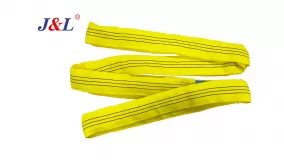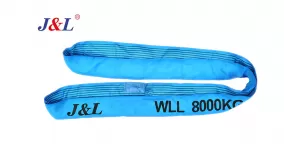When it comes to heavy lifting in industries such as construction, manufacturing, and logistics, choosing the right lifting equipment is paramount to safety and efficiency. Two popular options for heavy lifting are endless round slings and chain slings. Both have their merits and are suitable for various applications, but they differ in terms of construction, strength, durability, and flexibility. In this article, we will compare endless round slings and chain slings to help you make an informed choice for your lifting needs.

Endless Round Slings: Flexible and Reliable
Endless round slings are a versatile choice for lifting heavy loads. They are typically constructed from high-quality synthetic materials, such as polyester or nylon, wrapped in a protective outer layer. Here's how they stack up:
Strength and Load Capacity:
Endless round slings are available in a wide range of load capacities, making them suitable for both light and heavy lifting tasks.
They are designed to evenly distribute the load, minimizing the risk of damage to the load or the slings themselves.
Durability:
Endless round slings are highly resistant to abrasion, UV radiation, and chemicals, ensuring their longevity.
They are less susceptible to corrosion compared to chain slings, making them an excellent choice for outdoor and marine applications.
Flexibility:
Endless round slings are extremely flexible and adaptable to various load shapes and sizes.
They are less likely to damage delicate or finished surfaces on the load.
Safety:
Endless round slings offer excellent shock absorption, reducing the risk of load damage and ensuring worker safety.
Regular inspections can help identify wear and tear, ensuring that damaged slings are replaced promptly.

Chain Slings: Rugged and Durable
Related articles:Understanding the Benefits and Features of Cylindrical Lever LocksUnveiling the Many Applications and Benefits of Webbing Slings in Various IndustriesHow to Choose a Machine Vise?What are Tapered Roller Thrust Bearings?Importance and Applications of Bearing PlateWhat Is Plastic Injection Molding, And How Does It Work?32-Strand Braided Rope: A Versatile and Durable Option for Various ApplicationsChain slings, on the other hand, are known for their robustness and durability. They consist of metal chain links and components. Here's how they compare:
Strength and Load Capacity:
Chain slings are incredibly strong and have high load capacities, making them ideal for heavy-duty applications.
They are designed for particularly demanding lifting tasks, including those involving extreme temperatures.
Durability:
Chain slings are resistant to abrasion, heat, and chemicals, making them suitable for harsh environments.
With proper maintenance and lubrication, chain slings can have a long lifespan.
Flexibility:
Chain slings are less flexible than round slings and may not conform as easily to irregularly shaped loads.
Their rigidity can be an advantage when lifting heavy, stable loads.
Safety:
Chain slings provide excellent durability and reliability, minimizing the risk of sling failure during lifting operations.
However, they can be more prone to causing damage to delicate or finished surfaces on the load.
Conclusion: Choosing the Right Sling for Your Needs
The choice between endless round slings and chain slings ultimately depends on the specific lifting requirements of your industry and the nature of your loads. Endless round slings offer flexibility and are suitable for a wide range of applications, especially those involving delicate or finished surfaces. Chain slings, on the other hand, excel in heavy-duty, high-capacity lifting tasks and rugged environments.
To make an informed decision, it's crucial to assess your lifting needs carefully, considering factors such as load capacity, load shape, environment, and budget. Additionally, regular inspections and proper maintenance are essential for ensuring the longevity and safety of both endless round slings and chain slings in any industrial setting.
Related articles:When And How To Use Non-Sparking ToolsWhat are the limitations of aluminum extrusion?Selecting the Right Spherical Hex NutHow to Choose The best Hotel FaucetHow to Choose the Right Roller Bearings for Your NeedsHow do Belleville disc springs work?Advantages and Applications of Thread Bar






Comments
0Related Articles
By May
143
0
0
By CC
186
0
0
By May
145
0
0
By CC
170
0
0
By CC
128
0
0
By CC
139
0
0
By May
135
0
0
By May
141
0
0